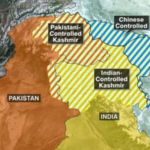Hong Kong
CNN
—
As US Treasury Secretary Janet Yellen gears up Friday for two days of meetings with officials and economists in Beijing, she has a tough job: to stabilize a fractious relationship that worsened this week when China retaliated in a tech war with the United States.
On Monday, China announced restrictions on exports of two strategic materials needed to make semiconductors, which are crucial for the normal functioning of daily life and a growing source of tension between the world’s top two economies.
“This is just the beginning,” Wei Jianguo, a former Chinese vice-minister of commerce, told the official China Daily. “China’s tool box has many more types of measures available.”
The issues that need to be worked out between the superpowers are thorny and complex, even as their economies seem to defy talk of decoupling to become ever more intertwined.
Yellen’s visit comes at a moment when the global economy faces much uncertainty, as China’s post-Covid recovery loses momentum, Europe tries to pull out of a recession and the United States is still at risk of one.
The global economy stands to gain if Washington and Beijing can mend fences, but analysts say this appears unlikely.
“The two countries have misaligned and competing strategic interests. The relationship is at its lowest point in decades, marked by palpable and mutual distrust,” said Anna Ashton, director of China corporate affairs and US-China relations at Eurasia Group.
Here are four things likely to make it harder for Yellen to repair US-China ties, and one thing keeping the relationship going.
The tussle over the future of semiconductors has escalated in recent months, drawing in Japan and Europe. Beijing played a trump card earlier this week when it imposed export controls on two raw materials, gallium and germanium, that are critical to the global chipmaking industry.
This was perceived as China’s second counter measure to a US ban on advanced chip sales to China, which was announced by the Biden administration last year. Sanctioning one of America’s biggest memory chipmakers, Micron Technology
(MU), in May was Beijing’s first.
Wei was quoted by China Daily as saying the decision to announce curbs was made after “thoughtful consideration” and was designed to “not only cause panic in certain countries, but also exert heavy pain in them.”
Analysts believe limits on the export of rare earths, a group of 17 elements for which China controls more than half of the global supply, could be the next way for China to hit back.
In October, the US government unveiled a set of export controls banning Chinese companies from buying advanced chips and chip-making equipment without a license. According to multiple media reports, the curbs will be expanded to restrict the sale of some artificial intelligence chips.
The sanctions strike at the heart of Beijing’s tech ambitions, as chips are vital for everything from smartphones, self-driving cars, and advanced computing to weapons manufacturing.
China has strongly criticized such restrictions on tech exports and will do all it can to ensure they don’t hold back its own development.
Beijing’s crackdown against Western consulting and due diligence firms has also unnerved US businesses.
In April, Beijing updated its counter-espionage law, which expanded the list of activities that could be considered spying.
Over the past few months, officials have launched a spate of raids on consultancies, including Capvision, Bain & Company and the Mintz Group.
The authorities accused Capvision, which is based in Shanghai and New York, of helping to leak sensitive military information to foreign forces.
Analysts said Chinese President Xi Jinping’s enhanced focus on national security is creating political risks that are making it harder for foreign firms to do business in China.
Some funds and research firms have shut their China offices following the crackdown, including Forrester Research and the Ontario Teachers’ Pension Plan.
Since earlier this year, the Biden administration has been mulling new rules that could limit investment in key parts of China’s economy by American businesses, according to multiple media reports.
In April, a group of congressional Republicans called on the administration to “use all available tools” to sanction cloud computing firms with links to China.
The US government has long scrutinized foreign investment into the country. But rules regulating US investment abroad would be a new step, part of a broader effort to make it harder for China to develop key technologies that could support its military.
Rising geopolitical tensions have put many companies in a tough position.
Last month, venture capital titan Sequoia split off its China business after its expansive investments in China, often in tech startups, drew attention from US lawmakers.
Sequoia’s executives said in a statement that it has become “increasingly complex” to run a decentralized global investment business.
TikTok is also fighting to save its operations in the United States as a growing number of lawmakers raise national security concerns about the company’s ties to China.
Hawks have been calling for the US to decouple from China, an unrealistic proposition given the extent of the bilateral trade and investment ties.
Still, US President Joe Biden and his European allies have repeatedly stressed the desire to “de-risk” their relationships with the Chinese economy, not least because of lessons learned since Moscow ordered the full-scale invasion of Ukraine last year about relying on Russia for energy and other commodities.
The war in Ukraine has fueled worries over Taiwan, which China has threatened to invade.
The concerns have led to coordinated efforts to remove China from technology supply chains that can be used to advance its military strength.
That has been met with strong opposition from Beijing.
“Some people in the West are hyping up so-called concepts of reducing dependency [on China] and de-risking. I would say these concepts are false propositions,” Chinese Premier Li Qiang said last month at a World Economics Form in the northern Chinese city of Tianjin.
He called for “de-risking” decisions to be made by companies rather than governments. Economic globalization remains unchanged, and there should be more cooperation and communication, he added.
President Xi said Tuesday that Beijing opposes “decoupling.”
China wants to work with nations to “reject the moves of setting up barriers, decoupling and breaking links,” he told leaders of the Shanghai Cooperation Organization, according to a text of his speech carried by the official Xinhua news agency.
Despite the tension, consumers and businesses in the two economies remain deeply connected.
China is among the top two holders of US debt, and the US is still China’s single largest trading partner.
Last year, trade in goods between the two economies climbed to nearly $691 billion, breaking the previous record set in 2018, according to US Commerce Department data.
America’s deficit in goods traded with China increased 8% to $382.9 billion, also the biggest on record.
“Trade between the two superpowers is bifurcating and it’s a paradox. Even as strategic supply chains decouple, in other areas multinational enterprises are doubling down on their in-China-for-China operations,” said Alex Capri, senior lecturer at the National University of Singapore Business School.
On Wednesday, US pharmaceutical firm Moderna
(MRNA)signed a deal to make its first major investment in China. Tesla
(TSLA) has announced plans to open a second factory in Shanghai to produce large batteries used to store huge amounts of electricity.
“The China market remains critically important to many US companies’ global competitiveness. The sheer size of the market is unmatched,” Ashton said.
But she warned that businesses and consumers have yet to to see the full effects of sanctions that have been promulgated by both sides, and more such measures are certainly coming.
“Both sides are ramping up commercial restrictions in the name of national security and national interests,” she said.
“If [the trend] continues to build, it could indeed threaten the two countries’ ability to maintain robust economic engagement even where the goods and services in question are seemingly mundane and benign.”
— CNN’s Jennifer Hansler, Wayne Chang and Bryan Mena contributed reporting.
Author Profile
- "Far Left" Bias Rating
- The Cable News Network is a multinational cable news channel headquartered in Atlanta, Georgia, U.S. Founded in 1980 by American media proprietor Ted Turner and Reese Schonfeld as a 24-hour cable news channel.
Latest entries
 HeadlinesApril 28, 2024Kashmir Fast Facts
HeadlinesApril 28, 2024Kashmir Fast Facts HeadlinesApril 28, 2024'Westernization is not the answer': Artist Àsìkò explores Yoruba culture through mythology
HeadlinesApril 28, 2024'Westernization is not the answer': Artist Àsìkò explores Yoruba culture through mythology HeadlinesApril 27, 2024Pro-Palestinian protests continue at colleges across the US
HeadlinesApril 27, 2024Pro-Palestinian protests continue at colleges across the US HeadlinesApril 27, 2024Tony Awards Fast Facts
HeadlinesApril 27, 2024Tony Awards Fast Facts

